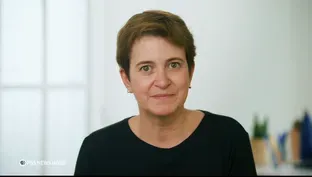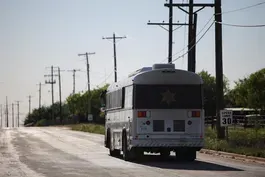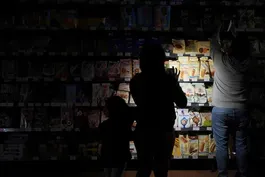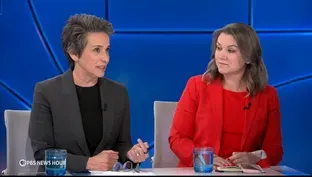
People with disabilities discuss impact of Medicaid cuts
Clip: 4/28/2025 | 10m 19sVideo has Closed Captions
People with disabilities explain how Medicaid cuts could impact their lives
Congress is back in D.C. with plans to move forward on a budget framework that could include cuts to Medicaid. About one in three people with disabilities is enrolled in the program which helps them access health care and live independently in their communities. Stephanie Sy reports and we hear from people with disabilities and their caretakers about what Medicaid means to them.
Problems with Closed Captions? Closed Captioning Feedback
Problems with Closed Captions? Closed Captioning Feedback
Major corporate funding for the PBS News Hour is provided by BDO, BNSF, Consumer Cellular, American Cruise Lines, and Raymond James. Funding for the PBS NewsHour Weekend is provided by...

People with disabilities discuss impact of Medicaid cuts
Clip: 4/28/2025 | 10m 19sVideo has Closed Captions
Congress is back in D.C. with plans to move forward on a budget framework that could include cuts to Medicaid. About one in three people with disabilities is enrolled in the program which helps them access health care and live independently in their communities. Stephanie Sy reports and we hear from people with disabilities and their caretakers about what Medicaid means to them.
Problems with Closed Captions? Closed Captioning Feedback
How to Watch PBS News Hour
PBS News Hour is available to stream on pbs.org and the free PBS App, available on iPhone, Apple TV, Android TV, Android smartphones, Amazon Fire TV, Amazon Fire Tablet, Roku, Samsung Smart TV, and Vizio.
Providing Support for PBS.org
Learn Moreabout PBS online sponsorshipAMNA NAWAZ: Congress returns to D.C. today with plans to move forward on a budget framework that includes some $1.5 trillion in spending cuts.
It would pave the way for President Trump's domestic agenda, including slashing taxes, but it could also include cuts to the federal Medicaid program.
One in three people with disabilities are enrolled in the program, which helps them access health care and live independently in their communities.
Stephanie Sy has more in just a moment, but first we hear from people with disabilities and their caretakers on what Medicaid means to them.
JESSICA SIBLEY, Mother of Medicaid Recipient: My name is Jessica Sibley.
I live in the Front Range of Colorado.
And I have a 10-year-old boy named Isaac (ph) on the spectrum.
And he is a happy, bright, beautiful boy.
KEITH JONES, Medicaid Recipient: My name is Keith Jones.
I have cerebral palsy, and I'm an activist advocate based out of Boston, Massachusetts.
DIANA VILA, Medicaid Recipient: My name is Diana Vila.
My disability is bipolar depression and I also have physical disabilities.
And I live in New York.
MARTHA HAYTHORN, Medicaid Recipient: My name is Martha Haythorn, 25 years old.
I'm from Atlanta, Georgia.
And I have Down syndrome.
Medicaid helps me access to transportation and to my community.
I don't want to lose my community, and I don't want to lose my transportation to even get there.
I'm extremely social.
I deserve to be there.
Without these benefits, I can't do that.
KEITH JONES: What does Medicaid look like in terms of my ability to function?
I need to have access to getting a wheelchair, having access to what we call personal care attendant, which is somebody who assists me with activities to deal with living, if I'm out in the community, helping me get in and out of places, helping meal prep, some of the very things that people would think are innocuous, but are essential to engaging yourself in the community.
DIANA VILA: I use Medicaid for a lot of things.
I see doctors, psychiatrists, physical therapists.
My care coordinator helps me make and keep appointments, especially because my disability.
Sometimes, I have difficulty concentrating and focusing.
So having someone who will help me coordinate my care is really important.
JESSICA SIBLEY: With the access I have to Medicaid, for my son's disability, he has access to lots of therapies that benefit him in life to become a productive person in the world, this tough world, because sometimes it's really hard.
And if we lose them, we lose our routine.
He loses that connection with those people who have helped us and has worked on this journey with us to get him where he is, and then we're almost starting fresh again.
KEITH JONES: What's at stake personally is my health.
And if you don't have health, you don't have life.
The ability to just be able to get out of bed, being a Black man in the United States, how do I mitigate these exacerbating health care conditions without medical coverage?
MARTHA HAYTHORN: Is it really worth taking away someone's benefit, someone's life, someone's accommodation?
My message to people who want to cut Medicaid is, really think about your own life and think about your own sons or daughters or nieces or nieces of people in your life.
Would you do the same thing to them in your own family?
DIANA VILA: I'm very worried about potential cuts to Medicaid, because my life would really be disrupted, and I wouldn't be able to do what I can do right now.
Now I can live in my home with my fiance.
And I'm six weeks away from graduation with a master's degree, and I'm very excited about that.
JESSICA SIBLEY: After getting diagnosed on Medicaid, after doing our first couple intense therapies, he was able to finally speak to us and repeat our words.
We saw more eye contact.
He said -- finally said "I love you" because he was repeating what we said and finally called us mom and dad.
I'm definitely worried about any potential cuts to Medicaid.
I don't know exactly what it will mean for us, but cutting any type of these programs would hurt us or hurt many families.
STEPHANIE SY: For more, I'm joined now by Alison Barkoff, a professor at George Washington University's School of Public Health and a disability rights advocate who has worked directly on Medicaid policy.
Alison, thank you so much for joining the "News Hour."
I want to jump right into this, because a lot of the concern that we just heard from people with disabilities is the fact that the budget framework recently passed by Congress requires the committee that oversees Medicare and Medicaid to cut some $880 billion from the budget in the next 10 years.
Describe just the magnitude of cuts of that size.
ALISON BARKOFF, George Washington University: Medicaid is the primary funder of home and community-based services.
Those are the services that allow people with disabilities to live in their own homes, to get out of bed, to shower, to cook, to go out and participate in the community.
And these services are critical.
They are optional for states to provide.
And currently we have 700,000 people sitting on waiting lists.
When we start hearing about cuts of the magnitude of $880 billion, what's really important to remember is cuts to state Medicaid programs will necessitate cutting optional programs, the first thing to go.
And my colleagues and I have just published a paper looking at this.
Every time there are budget shortfalls in states, even if states don't want to impact people with disabilities and older adults, they have no choice but to cut optional programs like home and community-based services.
STEPHANIE SY: President Trump has said over and over again that he has no plans to cut Medicaid benefits.
He says he's talking about waste and fraud in the amount of some half-a-trillion dollars, mostly in Medicare and Medicaid, that could make up for these cost savings that are required.
Why doesn't that put your mind at ease?
ALISON BARKOFF: There is simply nowhere near enough -- quote, unquote -- "waste" to reach the levels of $880 billion.
At the end of the day, the proposals that are being discussed are simply cuts to Medicaid funding.
And what they are going to feel like to states is big holes in their Medicaid budgets, forcing them to make very hard choices that will require cuts to services and to people covered.
STEPHANIE SY: We are hearing from Republican lawmakers things like reinstituting work requirements for Medicaid recipients.
And the CBO, as you mentioned before, says that could save more than $100 billion.
What do those types of requirements mean in actuality for people with disabilities?
ALISON BARKOFF: In the few places where states have put in place work reporting requirements, we have seen that they have led to large numbers of eligible people being kicked off Medicaid.
And, in fact, we have seen the red tape and the challenges of reporting hurting people with disabilities and people who provide them care.
It is a very cumbersome process for reporting, and in some places even having to report on a monthly cadence.
So we know that the reason it saves $100 billion, $200 billion is because eligible people will be kicked off Medicaid.
And, again, from states like Arkansas, from the experiment in Georgia, we are seeing that people with disabilities and their caregivers are absolutely hurt by these work reporting requirements, even if the intent is to exclude them and carve them out.
STEPHANIE SY: The Trump administration, as you know, has now proposed a number of other policies that could affect people in the disabilities community, the elimination of the Department of Education, changes at Social Security.
What is the general feeling among folks with disabilities right now under this new administration?
ALISON BARKOFF: When we're talking about the Department of Education, the funding through the Individuals with Disabilities Education Act is critical to helping people with disabilities participate alongside their non-disabled peers in their own classrooms and schools in their neighborhood.
Now, we just saw the Administration for Community Living, the agency in the U.S. Department of Health and Human Services that's focused on implementing disability programs, announce that it would be dismantled.
So we are seeing just a lot of critical programs, from community supports to education supports to safety net programs like Social Security and critical programs funded through the administration for community living, all at risk.
People are scared about what that could mean in their lives and certainly are out there advocating to make sure that these programs are not cut and that their rights are not violated.
STEPHANIE SY: That is Alison Barkoff, a professor at George Washington University and disability rights advocate, joining us.
Thank you, Alison.
ALISON BARKOFF: Thank you again for having me today.
Breaking down the first 100 days of Trump's 2nd term
Video has Closed Captions
Clip: 4/28/2025 | 8m 39s | Breaking down the first 100 days of Trump's 2nd term and the effects of his agenda (8m 39s)
A Brief But Spectacular take on motherhood
Video has Closed Captions
Clip: 4/28/2025 | 3m 41s | A Brief But Spectacular take on motherhood as a master's in soft skills (3m 41s)
Children who are citizens deported with mothers, lawyers say
Video has Closed Captions
Clip: 4/28/2025 | 4m 47s | Children who are U.S. citizens deported along with foreign-born mothers, attorneys say (4m 47s)
News Wrap: Massive power outage hits in Spain and Portugal
Video has Closed Captions
Clip: 4/28/2025 | 7m 34s | News Wrap: Massive power outage disrupts daily life in Spain and Portugal (7m 34s)
Russia offers temporary ceasefire, Ukraine wants longer deal
Video has Closed Captions
Clip: 4/28/2025 | 5m 26s | Russia offers short-term ceasefire as Ukraine demands immediate, lasting peace (5m 26s)
Tamara Keith and Amy Walter analyze Trump's first 100 days
Video has Closed Captions
Clip: 4/28/2025 | 8m 9s | Tamara Keith and Amy Walter analyze Trump's first 100 days (8m 9s)
White House touts first 100 days of immigration crackdown
Video has Closed Captions
Clip: 4/28/2025 | 3m 9s | White House touts aggressive immigration crackdown in Trump's first 100 days (3m 9s)
Providing Support for PBS.org
Learn Moreabout PBS online sponsorshipSupport for PBS provided by:
Major corporate funding for the PBS News Hour is provided by BDO, BNSF, Consumer Cellular, American Cruise Lines, and Raymond James. Funding for the PBS NewsHour Weekend is provided by...


















